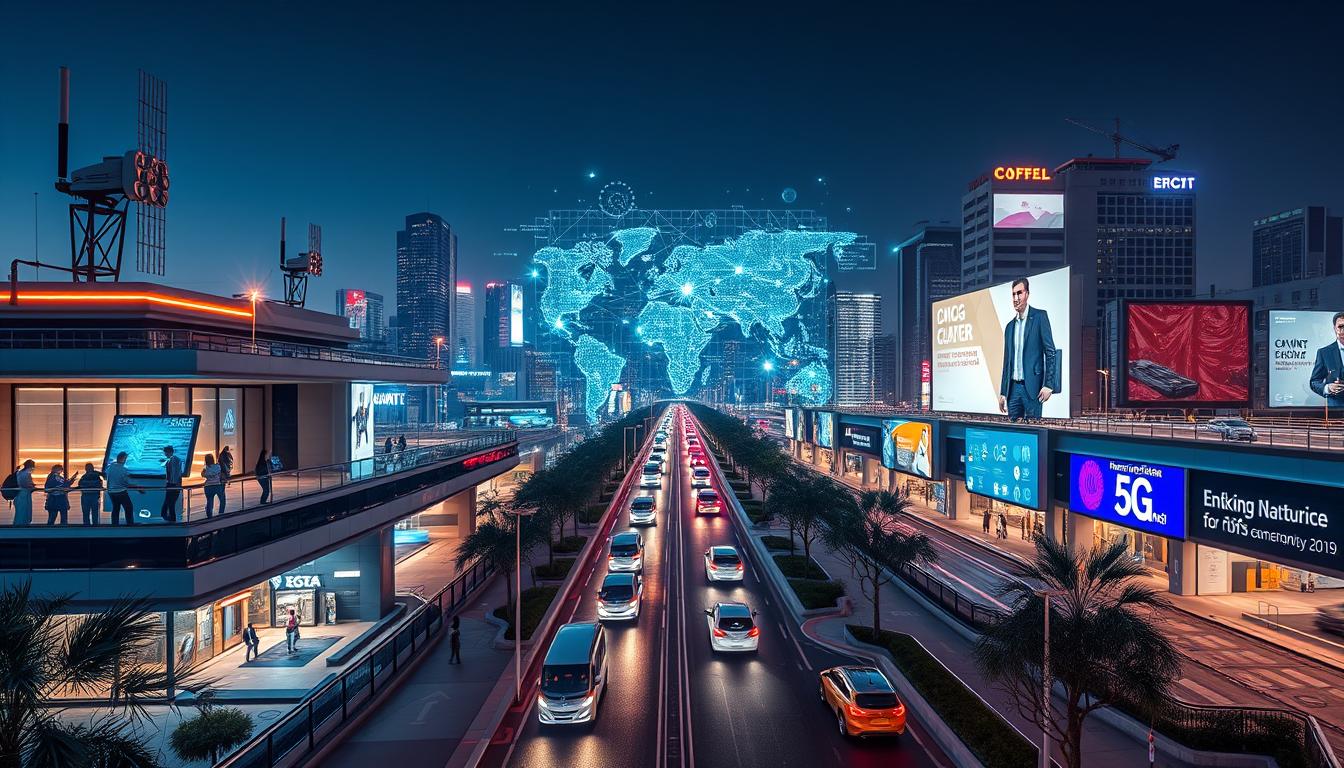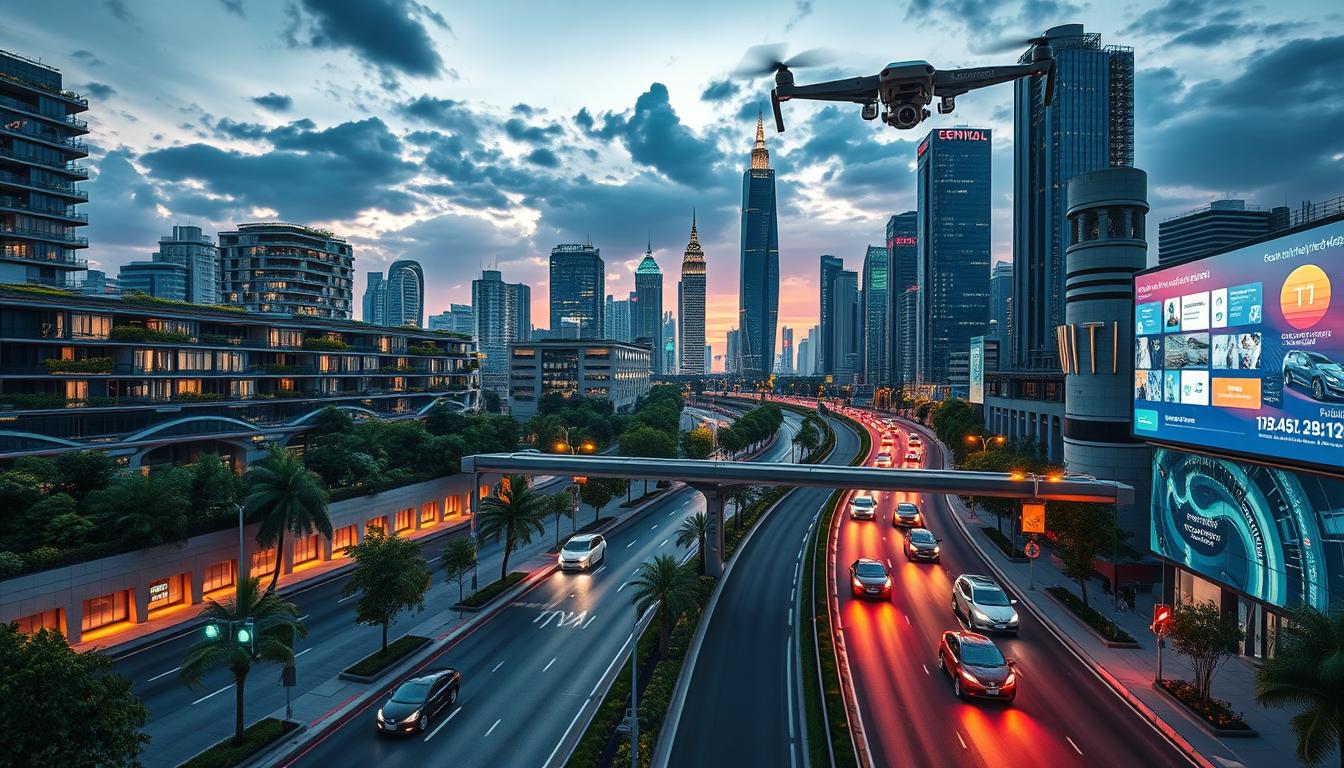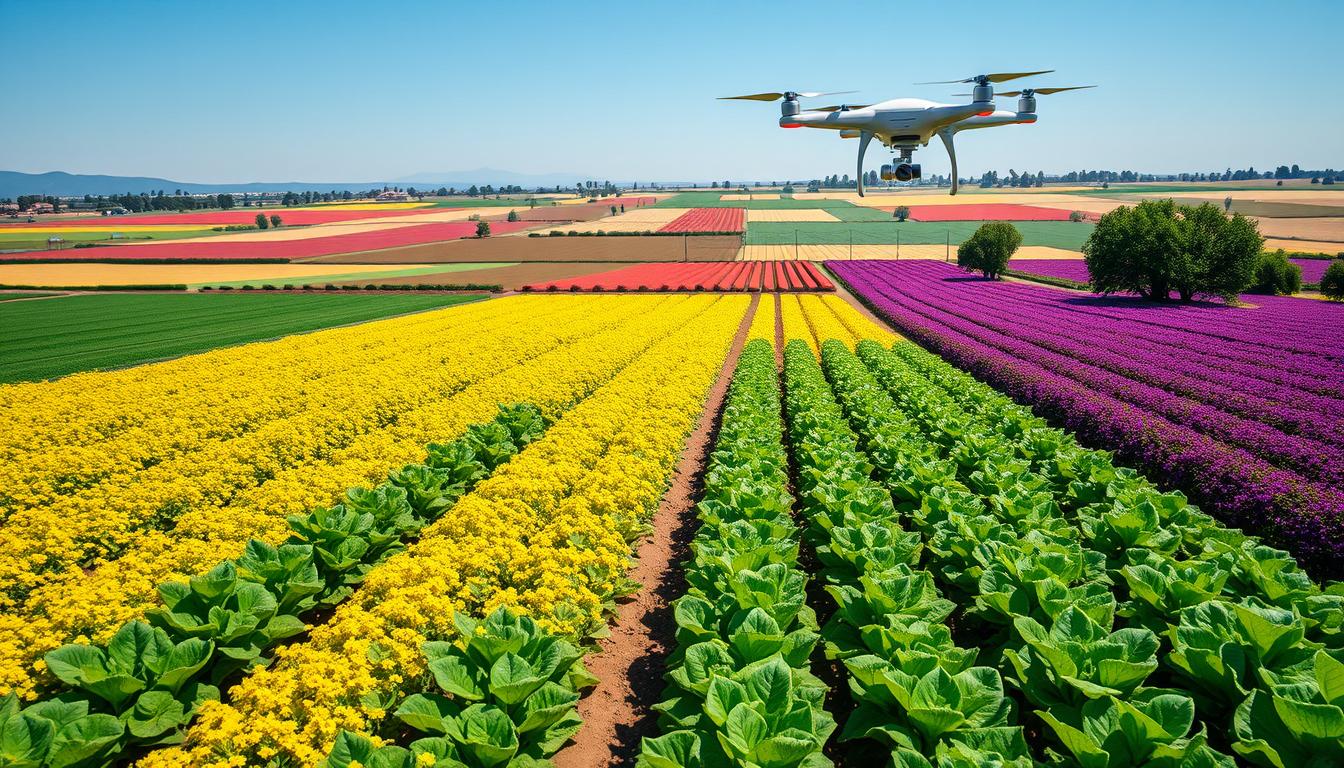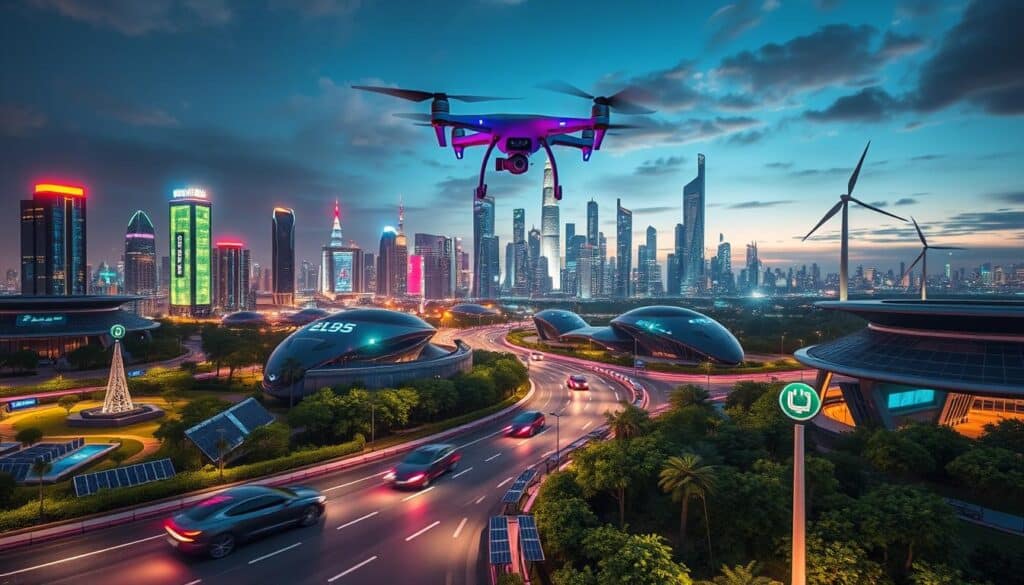Technology is moving faster than ever in our world today. It seems like every day, we hear about new tech that will change our future. But with so many updates, it’s hard to keep up with the progress. This guide will look at the top future technologies like artificial intelligence, quantum computing, and more. We’ll see how these innovations are changing industries and our daily lives.
Key Takeaways
- Rapid technological advancements are transforming our world at an unprecedented pace.
- This guide will delve into the most cutting-edge innovations shaping the future, including AI, quantum computing, 5G, and more.
- Understanding these emerging technologies is crucial for staying ahead of the curve and embracing the future.
- Exploring the impact of these innovations on industries, everyday life, and society as a whole is the focus of this comprehensive overview.
- Readers will gain valuable insights into the technologies that will define the coming years and beyond.
Cutting-Edge Technologies Shaping Our Future
Artificial intelligence (AI) is changing the game in technology, making creativity and innovation soar. Thanks to advanced algorithms like GPT and DALL-E, AI is now a big deal in many areas. It helps write articles, make educational stuff, craft marketing, and even compose music.
Also Read : Exploring Artificial Intelligences Trends & Insights
This tech is making creative tools available to more people and businesses. Now, folks can make high-quality, unique content fast. As AI gets better, the ways we can use it in creativity keep growing.
Also Read : What Is Workforce Diversity In US Government Agencies?
AI-Generated Content: The New Frontier of Creativity
AI-generated content has brought both cheers and concerns. It helps creators and pros work faster and find new ways to be creative. But, it also makes us think about things like realness, rights, and the value of human touch in a world that’s getting more automated.
Also Read : Protect Your Business With Commercial Insurance
As AI tools get better and more common, we’re all figuring out how to deal with this new kind of content. We need to find a balance. We want the good stuff AI offers but also want to keep our human touch and trust in the digital world.
Also Read : How Do You Choose A Dissertation Topic?
| AI-Generated Content Applications | Potential Impacts |
|---|---|
|
|
“As AI-powered tools become more sophisticated, industries and individuals must navigate the complex landscape of generative content, balancing the benefits of increased efficiency with the need to preserve the human touch and maintain trust in the digital age.”
Quantum Computing: Revolutionizing Complex Computations

A new frontier is coming in digital technology that will change how we solve complex problems. Quantum computing, a big leap in computer science, is set to change what we think is possible.
Also Read : What Skills Are Needed To Work In Advanced Robotics?
Quantum computers work way faster than old computers thanks to quantum mechanics. They’re being used in things like cryptography and drug discovery. This tech can solve problems that were too hard before.
As it gets better, quantum computing will be key in making new discoveries in many fields. It will affect areas like computer science, data science, cybersecurity, and cloud computing. Its impact will be huge and deep.
“Quantum computing has the potential to revolutionize the way we solve complex problems, opening up new frontiers in scientific discovery and technological advancement.”
Quantum computing is still new but it’s going to change how we tackle scientific and technological challenges. Top universities and industries are pushing this digital frontier forward. We’ll see more innovative uses of this technology soon.
5G Expansion: Enabling Transformative Technologies

The rapid growth of 5G technology is changing how we use the digital world. As 5G spreads globally, it’s opening up a new era of big changes. These changes will shape our future.
The 5G Revolution: Powering the Future of Connectivity
5G offers faster data speeds, wider coverage, and more reliable connections than before. This is key for the next big tech leaps, like the Internet of Things, augmented reality, and autonomous vehicles. With its low delay and fast data transfer, these new techs can grow, opening up new chances for industries and users.
As 5G rolls out, it will deeply affect many areas, from smart cities and transportation to healthcare and entertainment. The 5G era will support real-time talks, letting computer scientists and data scientists find new solutions. They’ll use the power of cloud computing and digital technologies.
The growth of 5G shows how communication and technology keep getting better. This is thanks to the hard work of engineers, scientists, and industry leaders. With this new era of connectivity, the future is full of chances for innovation and change in many areas, thanks to 5G technology.
Virtual and Augmented Reality: Immersive Experiences

Technology is changing fast, and VR and AR are leading the way. These technologies are changing how we use digital content and interact with the world. They’re making experiences more real and engaging, changing fields like gaming, training, and retail.
VR systems are getting better with higher resolutions, better tracking, and more interactive parts. This makes VR more user-friendly, with lighter headsets and longer battery life. VR is now used in many areas, from games and fun to training and therapy. It lets people explore, learn, and engage in new ways.
AR is changing shopping by letting customers see products in real life through their devices. This makes shopping better and cuts down on returns. Customers can see how a product fits into their life before buying it. As XR tech grows, it will change how we use digital content and see the world.
| Virtual Reality | Augmented Reality |
|---|---|
| Fully immersive digital environments | Overlaying digital content onto the real world |
| Used in gaming, training, and therapy | Transforming the retail industry |
| Advances in display and motion tracking | Enhancing customer satisfaction and sales |
Virtual reality and augmented reality are getting better and will change how we use technology and see the world. They offer immersive, interactive, and transformative experiences.
“The future is a place where technology and human experiences converge, and virtual and augmented reality are at the forefront of this convergence.”
The Internet of Things: Building Smarter Cities

Our cities are growing and changing fast. The Internet of Things (IoT) technology is key in making them better. IoT uses many sensors and connected devices to change how we handle city life.
IoT in Smart Cities: Optimizing Urban Living
IoT in smart cities helps gather and analyze lots of data. This lets city leaders make better choices. It helps with traffic, public transport, energy use, and safety, making cities better places to live.
- Traffic management: IoT sensors track how cars and people move. This helps adjust traffic lights and bus schedules to cut down on traffic.
- Smart grids: IoT helps manage energy and water by watching and adjusting how they’re used. This makes cities use resources better and save money.
- Public safety: IoT sensors and cameras help emergency services get there faster and make cities safer.
IoT systems give smart cities lots of data. This helps them make smart choices and improve their infrastructure. This makes cities better for everyone. As internet of things, IoT, and new technologies get better, smart cities will change how we live even more.
“The Internet of Things is not just about devices, it’s about transforming the way we live and work.”
| IoT Application | Benefit |
|---|---|
| Traffic Management | Reduced congestion, improved commute times |
| Smart Grids | Efficient energy distribution, cost savings |
| Public Safety | Enhanced emergency response, improved security |
Biotechnology: Revolutionizing Agriculture

Advances in biotechnology are changing the agriculture world. They let us make crops that are better in many ways. These changes are set to change sustainable farming and help solve big global problems, making sure we have enough food for the future.
Tools like CRISPR gene editing help scientists and engineers make crops that can handle tough conditions like drought and salt. This is key to fighting the effects of climate change and keeping our food supply safe.
Thanks to scientific discoveries, the agricultural industry is now making crops that fight pests and diseases better, are more nutritious, and grow more. These innovative methods are changing how we farm in a green way.
Top universities and research centers are leading these technological leaps. They’re exploring new areas in biotechnology to tackle big food security issues. The mix of computer science, data science, and digital tech is speeding up progress in this field.
With more people on our planet, the importance of biotechnology in revolutionizing agriculture is clear. These innovative solutions are setting the stage for a greener and more tech-savvy future in farming.
“Biotechnology has the potential to transform the way we approach sustainable agriculture, helping to address global challenges and ensure food security for the future.”
Also Read : How Does Digital Transformation Affect Businesses?
Conclusion
The 21st century is seeing huge leaps in technology. We’re seeing big steps in artificial intelligence and quantum computing. Also, 5G networks and the Internet of Things are changing our world.
These new technologies are set to change many industries. They will solve big problems and change how we live and work. By using scientific discoveries, we can move forward in the digital world. This will help us use innovation to make a better, connected, and wealthy world.
As we keep exploring technology, we must do it responsibly. We should think about the good of humanity and the environment. By working together, we can tackle big challenges. This will help us create a future that’s both high-tech and caring for people and the planet.
FAQs
Q: How is AI expected to influence the 2024 election?
A: AI is anticipated to play a significant role in the 2024 election by improving voter engagement through chatbots on social media platforms, analyzing public sentiment, and optimizing campaign strategies using data-driven insights.
Q: What innovations in technology can we expect to see by 2024?
A: By 2024, we can expect innovations in artificial intelligence, sustainable technologies, and advancements in medicine and engineering, particularly from leading institutions like MIT and Silicon Valley startups.
Q: How is social media shaping the future of communication and technology?
A: Social media continues to evolve as a powerful tool for communication, influencing public opinion and political discourse, especially during events like the 2024 election. Its integration with AI could lead to personalized content delivery and enhanced user interaction.
Q: What role does Elon Musk play in technological innovation?
A: Elon Musk is a key figure in technological innovation, leading companies like Tesla and SpaceX. His ventures often focus on sustainable energy and space exploration, contributing to advancements that could redefine industries and improve humanity’s future.
Q: How can technology improve sustainability efforts?
A: Technology can improve sustainability efforts by enabling more efficient resource management, developing sustainable materials, and fostering innovations that reduce carbon footprints, such as renewable energy systems and smart agriculture.
Q: What is the significance of the Massachusetts Institute of Technology (MIT) in technology research?
A: MIT is a leading institution in technology research, producing groundbreaking innovations in AI, robotics, and engineering. Its research initiatives contribute significantly to the understanding and application of new technologies across various industries.
Q: How are chatbots being utilized in today’s tech landscape?
A: Chatbots are increasingly used in customer service, social media engagement, and personal assistance applications. They help streamline communication, provide instant responses, and enhance user experience across various platforms.
Q: What advancements in software can we expect to see in the near future?
A: Advancements in software are anticipated to focus on enhancing user privacy, improving machine learning capabilities, and integrating AI with everyday applications, leading to more intuitive and responsive technology solutions.
Q: How does the concept of a “new world” relate to current technological trends?
A: The concept of a “new world” reflects the transformative impact of technology on society, including shifts in work, communication, and lifestyle, driven by innovations in AI, social networks, and sustainable practices.
Q: What challenges do researchers face in the field of technology?
A: Researchers face challenges such as keeping pace with rapid technological advancements, addressing ethical concerns related to AI and privacy, and ensuring that innovations are accessible and beneficial to all sectors of society.


